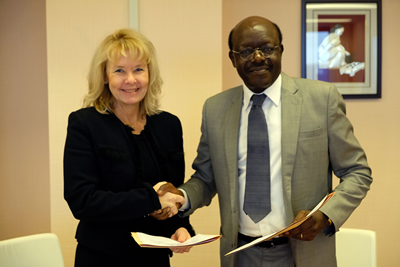A new $400,000 Finnish grant will help UNCTAD develop more training courses on how trade reforms and regional integration impact men and women differently around the globe.
Finland has renewed its commitment to UNCTAD’s work on trade and gender with a grant of more than $400,000 for the next two years.
Ambassador Terhi Hakala, the country’s permanent representative to the United Nations in Geneva, signed the official funding document with UNCTAD Secretary-General Mukhisa Kityui on 14 January at the Palais des Nations in Switzerland.
With the new funds, the Nordic nation remains the main sponsor of UNCTAD’s online trade-and-gender training courses. Since 2015, these have helped some 650 policymakers, researchers and development professionals in more than 100 countries to understand how trade impacts men and women differently and how gender inequality affects a nation's trade performance and competitiveness.
“The overall goal of Finnish development policy is to reduce poverty and inequality. It lays particular emphasis on the rights of women and girls and on strengthening developing countries' own economies to promote employment, livelihoods and well-being,” Ambassador Hakala said.
“I see that our cooperation with UNCTAD throughout the years has contributed well to that,” she added.
The need for gender-sensitive policies
Dr. Kituyi said: “Trade growth does not naturally lead to gender equality.”
“This is because the policies driving the growth often overlook the roles that women play in the domestic economy and the challenges they face,” he added.
UNCTAD research shows, for example, that the process of regional integration among members of the Southern Common Market (Mercosur) – Argentina, Brazil, Paraguay and Uruguay – has made only a slight dent in gender inequalities.
And while more trade openness among the four South American nations has spurred some new employment opportunities for women, most are low-skill, low-salary jobs.
“Governments are increasingly concerned about how their trade policies are impacting women, and we’ve seen a dramatic increase in requests to assist them,” Dr. Kituyi said.
“The new funds from the government of Finland will help us respond effectively to such requests,” he added.
More tailor-made courses
The new grant from Finland, for example, will allow UNCTAD to design more online training courses focused on specific issues, such as agriculture and technology, and more modules tailored to regions.
Tailor-made courses already exist for several African regions – an 8-week module for the Southern African Development Community for 70 government officials, academics and gender equality advocates was completed last month.
But Finland’s renewed support ensures the organization will be able to do likewise for other parts of the globe, starting with Central America.
“Trade and gender interact through multiple channels. Since these interactions are very context-specific, it’s important to develop more courses targeting specific regions and sectors,” said Simonetta Zarrilli, in charge of UNCTAD’s Trade, Gender and Development Programme.
“If policymakers are going to use trade policy as an effective instrument for gender equality and inclusive development, they need to understand the particularities of the country and region, and of the economic sectors where women are particularly active,” Ms. Zarrilli said.



